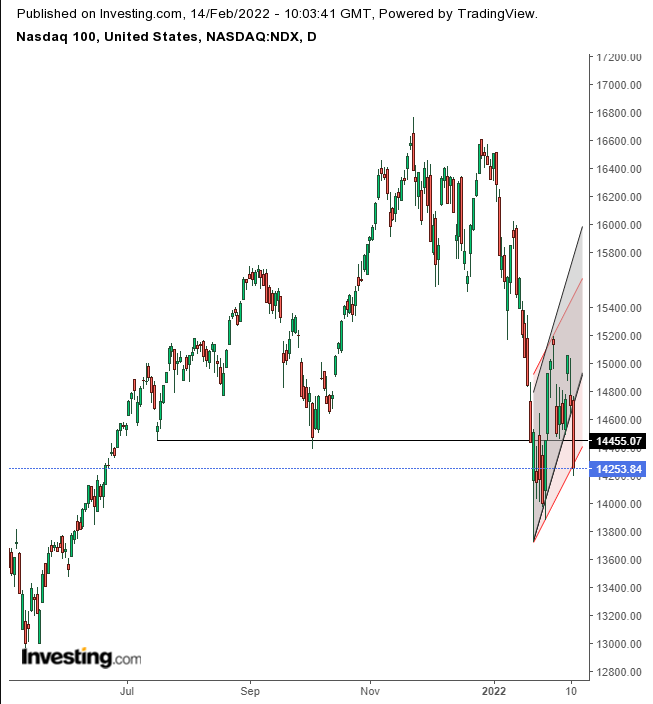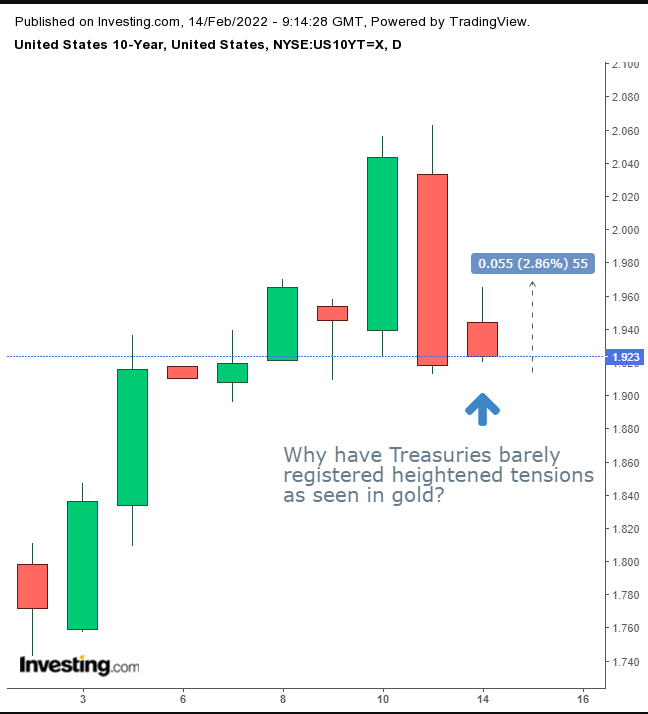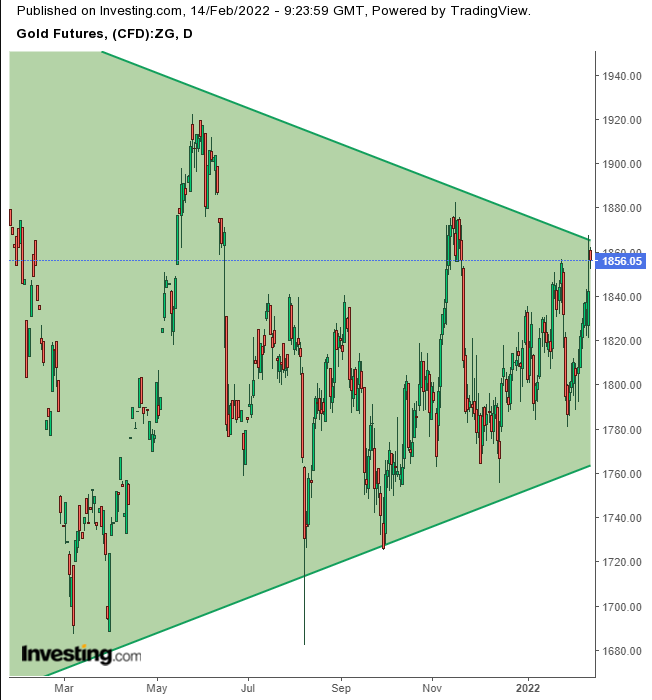- Global markets slump on heightened geopolitical tensions
- Gold futures surge
- Commodity volatility accelerates
- German Chancellor Olaf Scholz travels to Russia on Tuesday for diplomatic talks
- On Tuesday, US PPI figures are published.
- The EIA crude oil inventory report is printed on Wednesday.
- The STOXX 600 fell 2.7%
- Futures on the S&P 500 fell 0.8%
- Futures on the NASDAQ 100 fell 0.9%
- Futures on the Dow Jones Industrial Average fell 0.8%
- The MSCI Asia Pacific Index fell 0.6%
- The MSCI Emerging Markets Index fell 0.8%
- The Dollar Index rose 0.2%
- The euro fell 0.4% to $1.1309
- The Japanese yen fell 0.2% to 115.21 per dollar
- The offshore yuan was little changed at 6.3651 per dollar
- The British pound fell 0.3% to $1.3514
- The yield on 10-year Treasuries declined one basis point to 1.93%
- Germany's 10-year yield fell nine basis points to 0.20%
- Britain's 10-year yield fell five basis points to 1.49%
- WTI crude declined 0.3% to $92.84 a barrel
- Brent crude down 0.3% to $94.19 a barrel
- Gold futures surged 0.83% to $1,857.40 an ounce
Key Events
On Monday, futures contracts for the Dow Jones, S&P 500, NASDAQ and Russell 2000 and global stocks sold off as fears of a military conflict between the US and Russia over Ukraine escalated.
The dollar moved higher and Treasury yields slumped.
Global Financial Affairs
After all four US indices closed lower on Friday, futures continued to sink ahead of the US session open today. As well, the tech heavy NASDAQ 100 appears to be topping out.

In Europe, travel shares—which require economic calm to attract customers—led the STOXX 600 lower. Banks also underperformed, probably due to profit-taking after rallying on expectations of monetary policy tightening as higher interest rates provide lenders with more robust profit margins.
Australian shares were a lone green island in the Asian-Pacific sea of red indices. The ASX 200 climbed 0.37% thanks to a rally in gold. Australia is estimated to have the world's largest gold reserves, approximately 17% of global supply. It's therefore sensitive to the fate of the yellow metal, which surged on the heightening tensions at the Ukraine border. Also, an early spike this morning in oil prices boosted Australian energy stocks.
Japan's Nikkei 225 fell 2.23%, underperforming the region. The index was led lower by the transportation equipment, rubber, and non-metal minerals sectors which underperformed.
Yields on US Treasuries, including the 10-year note, were slightly lower after rallying earlier.

Given that yields possess a negative correlation with Treasuries, it means that investors are buying Treasuries. As such, it's somewhat puzzling why Treasuries have barely moved in reaction to one of the most tense days of the crisis thus far, while gold registered a dramatic bounce.
Gold futures jumped 0.8% to their highest level since Nov. 18. This marks the yellow metal's seventh straight gain, the longest streak since November.

The precious metal has been respecting the resistance of Friday's intra-day high, which underscored the supply line of the top of a symmetrical triangle.
The dollar advanced for the third day in a row, even as gold rose at the same time.
Bitcoin is continuing to slide. At time of writing the price is slightly lower than Friday's close. Nonetheless, the cryptocurrency had recovered slightly after reaching lows around the $35,000 level last month and it may move lower still. However, others disagree and believe the asset class could be ready to head toward new highs.
Oil was slightly higher. The price gave up earlier gains, when it reached its most elevated level since Sept. 1, 2014. However, after an eight-week straight climb, which put $100 for the commodity back in sight, traders took some profits amid the geopolitical crisis.
Those concerns have increased volatility in commodity prices. Russia is a world leader in the production of nickel and aluminum and it also mines 40% of the world's palladium. US wheat futures also pared an advance as Ukraine and Russia account for almost one third of global wheat exports. Last week the agricultural commodity posted its most significant gain since November.
